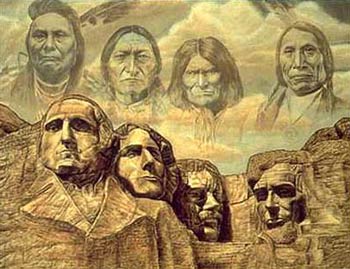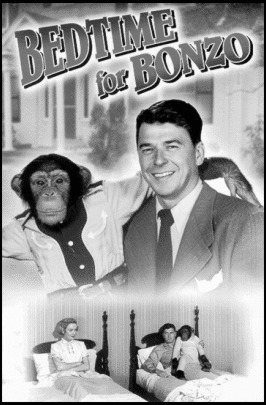 Another Stereotype of the Month entry:
Another Stereotype of the Month entry:
 Another Stereotype of the Month entry:
Another Stereotype of the Month entry:
Does 'Native' Now Mean 'Balkanize' in America?
By John Dendahl, 4/9/2006 8:34:43 PM
Why aren't we focused on giving all American citizens equal standing, as Dr. Martin Luther King argued?
Congress has under consideration the Native Hawaiian Government Reorganization Act of 2005. This legislation panders to a small, narrow interest to create yet another citizen group with special status. The dismal model for the Hawaiian bill is the special status of American Indians.
Rather than move backward with the Hawaiian bill, Congress should engage serious discussion leading toward normalizing citizenship for Indians.
One hears from those wanting to go the opposite way that other countries and the United Nations are considering special status for "indigenous" populations.
This isn't Latin America, and it isn't the United Nations. This is the United States, Ronald Reagan's "Shining City," doubtless history's leading accomplishment in assimilating peoples from all over the world into a culture intended to respect all and favor none. One need look no farther these days than our sometimes ally, France, to get a notion of America's greatness.
Yet the special status accorded Indians, amid enough fine quotations from statesmen to fill volumes, is largely a failure when measured by any reasonable standard of social progress. Their unclear status as both wards of the state and "sovereign" people have done much to foster myriad social pathologies.
In many instances, Indians' special status has led to conflicts with other Americans over rights to which we are all entitled. An ongoing dispute here in the Southwest is a prime example.
For more than 50 years, El Paso Natural Gas Company has operated pipelines crossing some 900 miles of the Navajo Nation's reservation. These deliver natural gas produced in New Mexico, Texas and other areas to millions of consumers in western states, including Navajos and other Indians. Royalties are earned by Navajos and other Indians for gas produced on their lands, and some are employed by EPNG and the producers.
EPNG's 20-year right-of-way agreement with the Navajos expired in mid-October. Renewal has been under negotiation for the better part of two years. Compared to the high end of prices paid for perpetual, not 20-year, easements across non-Indian lands, EPNG's offer is some 50 times above the market. The Navajos want 100 times, and the parties are about one-quarter of a billion dollars apart.
Why should anyone other than EPNG and the Navajos care? Because, for one thing, right-of-way prices become part of the cost paid by all served consumers — a wealth transfer to the Navajos as to which the consumers have no voice other than EPNG.
Another reason — interesting in any debate about Indians' status — is that the Navajo position has hints of treaty noncompliance.
The Navajos' 1868 treaty with the United States obligates them not to "oppose the construction of ... works of utility or necessity which may be ordered or permitted by the laws of the United States." The same treaty section obligates the government to "pay the tribe whatever amount of damage may be assessed by three disinterested commissioners" appointed by the President.
The pipeline is a work of utility ordered or permitted by federal law. In view of the impasse, EPNG has petitioned the U.S. Department of Interior, the Navajos' trustee, to renew the right-of-way.
That EPNG has negotiated with the Navajo Nation is, in itself, a gesture of especially good faith. Some would argue that EPNG and Interior could have bypassed Navajo leaders altogether, completed the renewal, and left the amount of payment to the three commissioners contemplated by the 1868 treaty. There seems no credible chance that this route would have brought the Navajos anything close to EPNG's offer, so consumers, including some Navajos and other Indians, would be better off with lower natural gas costs.
Reservation activities such as gambling, avoidance of state taxes on retail sales to non-Indians, and others also point to special advantage inconsistent with a uniform standard of citizenship.
My 800-pound gorilla nominee here is Indian religious claims intended to trump use of public lands by the rest of us. This issue raised its head again just weeks ago when a New Mexico Indian pueblo sued the U.S. Forest Service to void a permit for a new chairlift in a ski area that has operated for 57 years. Where is the crèche-busting ACLU when we need it?
Sen. Daniel Akaka, D-Hawaii, has the attention of Congress on his Native Hawaiian legislation. That makes this the perfect time to commence an earnest discussion as to how we achieve equal standing among all American citizens — none superior, none inferior, and all celebrated as individuals.
Lifelong New Mexican John Dendahl is a retired executive and political leader and a member of the Grassroot Institute of Hawaii Advisory Board.

Rob's reply
>> This is the United States, Ronald Reagan's "Shining City," <<
See A Shining City on a Hill: What Americans Believe for some thoughts on the "Shining City" metaphor. For the details on Reagan's ignorance of Native people, see Rob's Reply to Reagan.
>> doubtless history's leading accomplishment in assimilating peoples from all over the world into a culture intended to respect all and favor none. <<
The key word here is "intended." What the actual culture does is exalt historical white privilege over true equality.
>> Yet the special status accorded Indians, amid enough fine quotations from statesmen to fill volumes, is largely a failure when measured by any reasonable standard of social progress. <<
What Dendahl means is that the Indians' situation, not their status, is a failure. Yes, it's a failure so far in economic terms, for many reasons. Looming large among the is the federal government's failure to uphold the promises it made in the treaties it signed.
But a spiritual failure? A philosophical failure? A cultural failure? An artistic failure? Don't think so.
The status of tribes as sovereign nations isn't what's made them economically poor. It's what's kept them strong despite repeated attempts to reallocate their land and terminate their existence. Studies have confirmed that sovereignty is the best tool Indians have for maintaining their independence and increasing their strength—whether it's economic or cultural.
>> Their unclear status as both wards of the state and "sovereign" people have done much to foster myriad social pathologies. <<
You think an Indian sits around trying to figure out if he's sovereign or not? And because the answer is unclear, he takes to crime and substance abuse? Ridiculous.
You could just as easily, and far more legitimately, blame the social pathologies on the long history of broken treaties, harsh treatment, and negative stereotyping. Don't look for Dendahl to provide evidence that sovereignty causes "social pathologies" because no such evidence exists.
>> In many instances, Indians' special status has led to conflicts with other Americans over rights to which we are all entitled. <<
Residents of one state aren't entitled to the rights and benefits of another state—e.g., voting or getting a driver's license in that state. Similarly, residents of a state aren't entitled the rights and benefits of a Native nation within that state. Why not? Because it's a separate political entity just as another state is.
>> Reservation activities such as gambling, avoidance of state taxes on retail sales to non-Indians, and others also point to special advantage inconsistent with a uniform standard of citizenship. <<
We offer special privileges to all sorts of groups of people: Married couples, heterosexuals, people over 65, veterans, homeowners, farmers, et al. Unlike these groups, Indian nations existed before America did. Their rights are enshrined in the Constitution. Almost 200 years of court rulings have upheld them.
If you don't like it, amend the Constitution. Better yet, get over it.
>> My 800-pound gorilla nominee here is Indian religious claims intended to trump use of public lands by the rest of us. <<
These claims are intended to preserve the right of freedom of religion. That also is enshrined in the Constitution. In contrast, I don't see anything about the right to camp, hike, climb, or race off-road vehicles in that august document.
>> This issue raised its head again just weeks ago when a New Mexico Indian pueblo sued the U.S. Forest Service to void a permit for a new chairlift in a ski area that has operated for 57 years. <<
Where exactly is the right to a chairlift in the Constitution? I must've missed that clause.
>> Where is the crèche-busting ACLU when we need it? <<
Siding with the Indians, probably, if it follows its mandate to uphold a minority's constitutional rights no matter how unpopular they are with the majority.
>> That makes this the perfect time to commence an earnest discussion as to how we achieve equal standing among all American citizens — none superior, none inferior, and all celebrated as individuals. <<
Yes, let's. Here, discuss this: When any American signs an agreement such as a treaty with the government, no matter how onerous it seems to others, everyone will treat it equally. They'll all uphold it and follow it as the law of the land, just as they'd expect others to do if they signed an agreement. That's because we're all equal—none superior or inferior—and the law binds us all equally.
Related links
Indian rights = special rights
|
. . . |

|
All material © copyright its original owners, except where noted.
Original text and pictures © copyright 2007 by Robert Schmidt.
Copyrighted material is posted under the Fair Use provision of the Copyright Act,
which allows copying for nonprofit educational uses including criticism and commentary.
Comments sent to the publisher become the property of Blue Corn Comics
and may be used in other postings without permission.